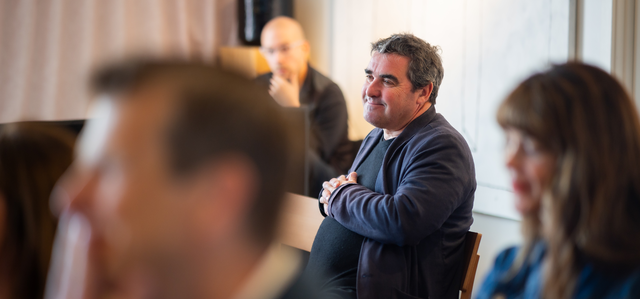Hit enter to search or Esc to close
Clive Black on why innovating around our food security should be the industry’s guiding light
Blog
20th May 2025

An imperative and an opportunity
Since Trump’s election, the world changes daily. That’s no reason for decision paralysis, says Dr Clive Black, vice-chairman and head of consumer research at Shore Capital.
Clive spoke to Newton following his guest speaker slot at our recent Food for Thought roundtable with industry on ‘Navigating the now and next’. In this article, he reveals what he thinks today’s political and economic volatility means for the food and drink industry. Most strikingly, he calls for everyone – from farmers, all the way through manufacturing and retail, to education and consumers – to unite. The goal? For the UK to innovatively produce more of its own food, guarding against inevitable global turmoil.
Not a day goes by without an unexpected political announcement or economic development. How does that impact the food and drink industry?
It’s not just the announcements themselves that cause uncertainty but the contagion impact. Everything has a potentially, and often, real complex knock-on effect. These are wildly unpredictable even, or perhaps especially, if decisions can be suddenly expanded or reversed.
Look at tariffs, for instance. Trump is introducing them on aluminium and steel so other blocs are responding by looking at Agri-commodities. Will American commodities experience inflation, or will those commodities be supplied by other regions? Where will American commodities be sold if they don’t go to China and similar markets? Will Britain improve terms of trade with America? That would be transformational on one hand, but it would also change the UK’s trade relationship with the EU, China and so forth.
Trade patterns are changing, there is an economic ripple effect but exactly how it will all play out – that is still up in the air.
Gaza, Ukraine, what may happen in the Far East… take all this into account too and it makes elements of business planning and capital allocation more challenging, riskier.
“If prices and unemployment go up and interest rates can’t come down, economic growth is a dream.”
Dr Clive Black
How is the current economic outlook likely to impact the UK’s food and drink businesses?
There has been a structural escalation in the cost base of the food system in the UK largely coming from the British Government’s policies. Add up the 6.7% national living wage increase, onto the 2024/25 9.9% wage increase, the National Insurance rise and extended producer responsibility (EPR) and the costs to industry are huge.
There’s only so much food and drink businesses can absorb; and so they will have to recover costs from consumers. British folks are seeing the highest tax take ever but the result is a very poor level of service delivery across health, councils, transport, water, policing and so on. The phrase, “Nothing works in the UK” is heard ever and ever more. Citizens are fed up and it feel as if they have to pay more for everything. But, within this context, if anyone wants to complain about rising food prices, contact the Chancellor of Exchequer, not Tesco.
The reality is every business is also having to examine its labour processes as a result of the evolving policy agenda. Hundreds of thousands of hard-working people will lose jobs, some replaced through automation, digitisation and robotics.
Surging food prices also mean the Consumer Price Index (CPI) will rise ahead of target, threatening the Bank of England’s capability to lower interest rates.
These are serious issues. If prices and unemployment go up and interest rates can’t come down, economic growth is a dream.
What could the government be doing differently?
The industry has reacted understandably negatively to the National Insurance rise and the Agricultural Property Relief (APR) and Business Property Relief (BPR) but they would have understood more if the government had engaged them and explained how it was going to sort its own house out too. Who knows, scrapping NHS England may be the worm turning.
“Shoppers will have to pay more for their food and drink and it’s up to the industry to make sure they know why that is the case.”
Dr Clive Black
What does all this mean for consumers?
Britain was the first country in the world to industrialise and effectively urbanise. The corn laws of the 1830s were the origins of the cheap food policy and it encoded in us that as long as we had food, we didn’t need to worry about where it came from and what it did to us.
That has to change. The domestic obesity crisis, adjusting weather patterns, which are a headache for agri-food systems, and increasing ethical considerations around how people and animals are treated mean the next generation of shoppers are more interested in where their food comes from. But creating ethical, healthy food as costs rise is more expensive. Shoppers will have to pay more for their food and drink and it’s up to the industry to make sure they know why that is the case.
“Let’s apply the brilliant thinking that the UK excels at to one of the biggest and most important challenges we face: food security.”
Dr Clive Black
What can individual businesses do today to thrive in uncertainty?
We need to improve the robustness and security of the UK food system, producing a lot more of our own protein, cereals, pulses, vegetables and fresh produce. Great Britain produces 40% to 43% of its own food. That’s really worrying for several reasons that we already know about, but no doubt more will come to light too.
During the pandemic, some countries stopped exporting food to make sure their own people were fed first. Energy costs rocketed as a result of the Ukraine war. When cold weather in North Africa and southern Spain meant fresh produce was in short supply, the UK was shorted because we don’t pay as much for our food as the EU. Now we’re facing Trump’s tariffs feeding into Agri-commodities. That’s more than enough evidence to make food security a real priority.
The food and drink industry is structurally vital to the basic functioning of our country. It’s the largest industrial system in the UK, employing more than 4.3 million people and with more acreage in land and buildings than any other sector. Yet, as a country we seem to be more interested in innovating around car batteries than food. Let’s apply the brilliant thinking that the UK excels at to one of the biggest and most important challenges we face: food security.
It’s a fantastic opportunity as well to produce and sell a whole lot more of our own food. It needs the industry from farming through to the food and beverage sector to see that potential and take the lead in realising it. Politicians will follow; they’re not capable of doing it.
It’s a big challenge with a massive solution requiring the brightest data, science and engineering minds tackling issues across every product category and structurally increasing production per acre and output per square foot. Vertical farming, plant and animal breeding, genetics, robotics, automation and digitisation are just some of the ways we can create a robust, future-proof, profitable food system.
Kickstarting change today
Based on recent discussions with leaders and his experience working side-by-side with people on the front line of the industry, Wil Schoenmakers, Global Head of Retail and Consumer Goods at Newton, believes three areas are pivotal for businesses to cope with today’s flux and tomorrow’s opportunities:
- Tackle the big opportunities – and resource up to tackle these brilliantly, whilst being comfortable that smaller opportunities are left for later
- Engage colleagues in the change – not all change will be positive for all stakeholders, but it’s critical that those people that are required to operate differently after the change, see the positives for them
- A laser focus on what really matters to the shopper and the consumer – avoid unnecessary costs and complications that don’t ultimately add value to the end consumer
Our teams are increasingly fielding a growing number of questions from clients about the practical implication of balancing vital cost improvements and enhancing the consumer proposition. The challenge is complex and requires decision-making that is equally data-led, human and innovative. This isn’t easy, but the businesses that are doing this best are striding ahead.
Now is the time for our industry to come together, build resilience, and prepare for ongoing disruptions and challenges. Newton thrives in complex, high-stakes environments, specialising in strategic delivery, turning strategic vision into plans, and plans into meaningful and lasting impact enabling the industry to respond and navigate exactly these types of challenges. Get in touch to find out how we could partner with you.

